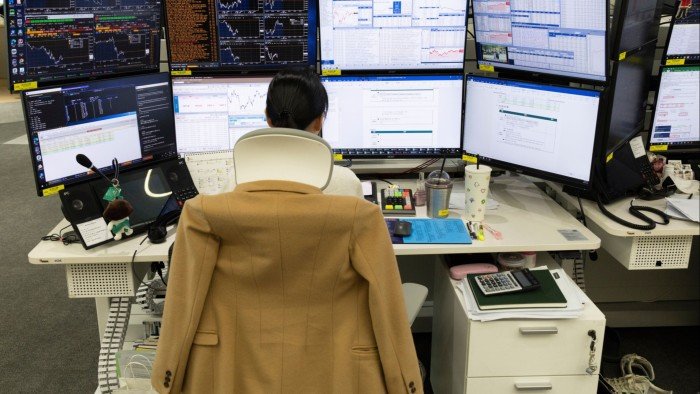US stocks post worst quarter since 2022 amid tariff fears

This article is an on-site version of our FirstFT newsletter. Subscribers can sign up to our Asia, Europe/Africa or Americas edition to get the newsletter delivered every weekday morning. Explore all of our newsletters here
Good morning and welcome back to FirstFT Asia. In today’s newsletter:
US equities suffer sharp pullback in Q1
Japan’s seismic warning
Is Iran on a collision course with the west?
Wall Street stocks posted their worst quarter in almost three years on fears that Donald Trump’s tariffs will usher in a period of stagflation in the world’s biggest economy.
What’s happening: The S&P 500 dropped 4.6 per cent in the first three months of 2025, the worst performance since the third quarter of 2022, FactSet data shows. The blue-chip index rose 0.6 per cent yesterday. Investors are bracing themselves for Trump’s “Liberation Day” event tomorrow, in which the US president is expected to announce fresh tariffs, on top of existing levies on imports of goods such as steel and aluminium.
What to expect: Sharon Bell, senior equities strategist at Goldman Sachs, said: “I don’t necessarily see the floor quite yet [in stock prices].” Goldman at the weekend said it now expected a 35 per cent chance of recession over the next year, up from 20 per cent previously.
Global reaction: European equities outperformed the US, in a marked shift from 2023 and 2024 when Wall Street zoomed past its rivals. Asian markets were mixed over the quarter, with Japan’s Topix sliding 4.5 per cent, China’s CSI 300 slipping 1.2 per cent, but Hong Kong’s Hang Seng rising 15 per cent per cent and Korea’s Kospi up 3.4 per cent.
“It is much more the uncertainty overall [that is] weighing on investor sentiment,” said Charles De Boissezon, global head of equity strategy at Société Générale. “The [tariff] announcements keep on changing, but what they have in common is that [they’re] just not good for growth globally.”
Here’s more on the tariff-fuelled uncertainty weighing on markets.
And here’s what else we’re keeping tabs on today:
Economic data: Australia reports February retail trade figures and Japan publishes its labour force survey for the month.
Monetary policy: The Reserve Bank of Australia is expected to hold rates steady when the central bank announces its decision today. (Yahoo Finance)
Leadership changes: Ivan Espinosa becomes Nissan’s chief executive while Sony President Hiroki Totoki takes on the CEO role of the Japanese tech conglomerate.
Five more top stories
1. Japan’s long-dreaded “big one” earthquake could kill almost 300,000 people along its urbanised Pacific coast, a new government forecast has warned. The report said a magnitude 9 quake in the Nankai Trough could cause $1.8tn of economic damage, equivalent to roughly half the country’s annual GDP.
2. The US has imposed sanctions on senior Chinese and Hong Kong security officials for transnational repression and degrading the autonomy of the territory. Washington placed the sanctions on six officials, including the commissioner of the Hong Kong police force, in response to China’s crackdown on pro-democracy activists in the territory.
3. One of the most prominent shareholder activists in Japan has accused Nippon Steel of harming minority investors in one of its biggest subsidiaries, as the steelmaker attempts to push ahead with a politically fraught $15bn takeover deal in the US. 3D Investment Partners has built a roughly 10 per cent stake in IT services group NS Solutions and is pushing for Nippon Steel to grant the subsidiary far more independence.
4. French far-right leader Marine Le Pen has been banned from standing for office for five years with immediate effect and sentenced to jail after being convicted of embezzling EU funds. The court ruling, which analysts described as a “major turning point in French political life”, is likely to block Le Pen from running in the 2027 presidential election, for which she was one of the favourites. Le Pen has vowed to appeal against the verdict.
5. Sales at one of China’s largest property developers fell by more than a third last year, as the country’s real estate market struggled to emerge from a slowdown now in its fourth year. The slump in sales at Country Garden was the largest annual drop for the group since a nationwide property crisis began in 2021 with the collapse of developer Evergrande.
The Big Read
Seven years ago, Trump tore up an accord with Iran that strictly limited its nuclear activities and had the buy-in of Europe, Russia and China. Now back in the White House, the president is confronting the repercussions, as Tehran has aggressively expanded its nuclear activity and is now locked on a collision course with the west that is set to come to a head this year.
We’re also reading . . .
Chart of the day
China was targeted by a record number of disputes at the World Trade Organization last year as the country’s booming exports swamped international markets and triggered objections from its commercial partners. New research showed that Beijing accounted for nearly half of all disputes lodged at the global trade body in 2024.
Take a break from the news . . .
Don’t miss this heartburn-inducing story on Argentina’s quest for pizza glory by Ciara Nugent, the FT’s Southern Cone correspondent.

Source link




